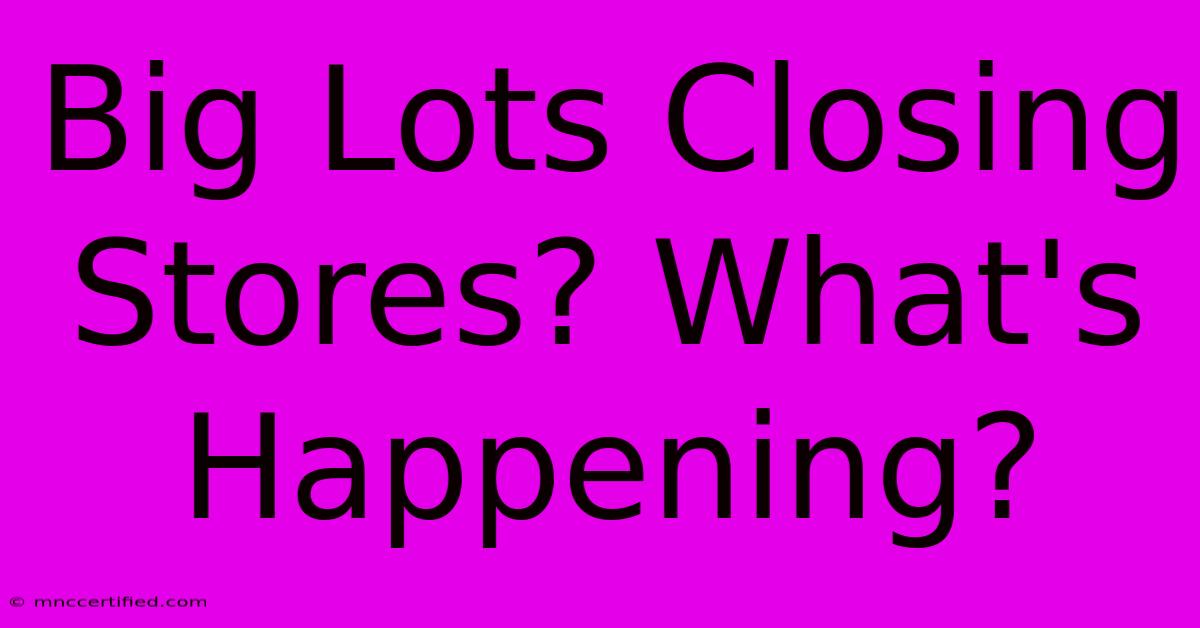Big Lots Closing Stores? What's Happening?

Table of Contents
Big Lots Closing Stores? What's Happening?
Big Lots, a popular discount retailer, has been making headlines recently due to store closures. While not experiencing a widespread collapse, the company is strategically streamlining its operations. This article delves into the reasons behind these closures, exploring the challenges faced by Big Lots and the broader retail landscape. We'll also look at what this means for shoppers and investors.
Why is Big Lots Closing Stores?
Several factors contribute to Big Lots' decision to close certain locations. It's crucial to understand that these closures are part of a broader strategy, not a sign of imminent failure. Here's a breakdown of the key reasons:
1. Performance Evaluation and Optimization:
Big Lots, like many retailers, regularly assesses the performance of its individual stores. Underperforming locations, those consistently failing to meet profitability targets, are prime candidates for closure. This is a standard business practice aimed at maximizing efficiency and resource allocation. This isn't necessarily about the specific location itself, but rather its profitability within the larger Big Lots ecosystem.
2. Lease Expiration and Renewal Costs:
Lease renewals can be costly, especially in prime retail spaces. If the cost of renewing a lease outweighs the potential profit generated by that specific store, Big Lots might choose not to renew, leading to closure. This is a common business decision, weighing the ongoing expenses against the return on investment.
3. Changing Consumer Behavior and Competition:
The retail landscape is fiercely competitive. The rise of e-commerce and the changing preferences of consumers necessitate adaptation. Big Lots might be strategically closing stores in areas where online competition is particularly strong or where consumer shopping habits have shifted significantly. This involves analyzing market trends and consumer preferences to determine where physical stores offer the most value.
4. Supply Chain Disruptions and Inflation:
The recent economic climate has presented numerous challenges for retailers. Supply chain disruptions and inflation have impacted profitability across the board. Big Lots, like other companies, is adjusting its store footprint to mitigate the effects of these macroeconomic factors. This might include closing locations that are disproportionately affected by increased shipping costs or inventory shortages.
What Does This Mean for Shoppers?
While store closures can be disappointing for loyal customers, it doesn't necessarily mean a complete disappearance of Big Lots. The company remains committed to its brand and is focusing its resources on more profitable and strategically important locations.
- Check your local store status: The best way to know if your local Big Lots is closing is to check the company's website or contact the store directly.
- Explore online options: Big Lots offers online shopping, providing alternative access to their products.
- Look for nearby locations: Even if your local store closes, other Big Lots stores might be within reasonable driving distance.
What Does This Mean for Investors?
Store closures are often viewed negatively by investors. However, in the context of a strategic restructuring aimed at improving profitability, they can be seen as a necessary step for long-term growth. Investors should carefully consider the company's overall financial health and strategic plan before making any investment decisions. Analyzing financial reports and following market trends are key to understanding the broader implications of these closures.
The Future of Big Lots
Big Lots is adapting to the challenges of the modern retail environment. While store closures are part of their strategy, the company is actively working to improve its overall performance and remain competitive. The key takeaway is that these closures represent a targeted effort to optimize operations, not necessarily a sign of impending failure. Only time will tell the ultimate success of their strategy, but proactive adaptation is essential for survival in the ever-changing retail landscape.
Keywords: Big Lots, closing stores, store closures, retail, discount retailer, business strategy, supply chain, inflation, consumer behavior, e-commerce, competition, profitability, investor, shopper, financial health, economic climate, lease renewal, underperforming stores, online shopping.

Thank you for visiting our website wich cover about Big Lots Closing Stores? What's Happening?. We hope the information provided has been useful to you. Feel free to contact us if you have any questions or need further assistance. See you next time and dont miss to bookmark.
Featured Posts
-
Ethan Slaters Ex Wife Lilly Jay Speaks Out
Dec 20, 2024
-
Wind Warning Christmas Travel Snow Forecast
Dec 20, 2024
-
Rhop Karen Huger Dui Verdict Details
Dec 20, 2024
-
Virgin River Season 6 Ending Explained
Dec 20, 2024
-
Virgin River Season 6 Finale Explained
Dec 20, 2024